- Home
- Steven Harper
Offspring Page 2
Offspring Read online
Page 2
A gentle tap on Kendi’s shoulder made him turn. Behind him stood Ched-Hisak, one of the equinoid Ched-Balaar. Like all of his species, the Ched-Hisak was the size of a small horse. Hay-colored fur covered a stocky body and four legs that ended in heavily-clawed feet. A thick, sinuous neck rose between two muscular arms that ended in four-fingered hands. His head was flat, with wide-set brown eyes and a lipless mouth filled with shovel-like teeth. His forehead sported a small hole just above and between his eyes. His forelegs were thicker and sturdier than the shorter hind legs, which gave a downward slant to the Ched-Balaar’s back. One finger sported a green jade ring similar to Kendi’s.
“Ched-Hisak,” Kendi said with a warm smile, and held out both hands, palms up.
Father Ched-Hisak placed his hands over Kendi’s and gripped his wrists in greeting. His palms felt like warm suede. Ched-Hisak opened his mouth and his teeth clattered in a complex rhythm punctuated by occasional soft hooting sounds from the nasal opening between his eyes. Half a lifetime of living among the Ched-Balaar let Kendi understand the language perfectly, though he had no hope of reproducing it.
“I wish to make you an invitation,” Ched-Hisak chattered after exchanging a few pleasantries. “It is time for Ched-Nel and Ched-Pek to leave the den, and it would please me much if you and Ben attended the ceremony.”
Kendi blinked and suppressed a small gasp. “It would be an honor!” he said. “But Ched-Hisak—are you sure you want us there? I’ve never known the Ched-Balaar to ask aliens to attend a Leaving for their ch—for their younger family members.”
Ched-Hisak dipped his head once. “You and Ben have been good and kind friends to me and my family for a long time, and it is my wish that you attend.”
“Then we’ll definitely come,” Kendi said. “When and where?”
“Four days from now in our home. We begin at noon. I have hope it will be a fine and festive occasion in a difficult time.”
“We could use some festivity,” Kendi sighed.
“It has been a difficult eight months,” Ched-Hisak chattered. “Our entire civilization was based on every one of us learning to reach the Dream. Now that has been taken from us.”
Kendi placed a hand on Ched-Hisak’s flank. “I’m sorry. I’ve been so busy running around putting out fires for the monastery that I haven’t had time to think about what the Despair means for your people.”
“I cannot find fault with you, Kendi,” Ched-Hisak said mildly. “You are the reason the Dream still exists, limited though it is. In any case, there is nothing you personally could have done. We Ched-Balaar have gone from Silent to Silenced. That is the way of it.”
“Except it was humans that nearly destroyed the Dream in the first place,” interrupted a third voice. “Our ancestors should never have brought humanity into the Dream in the first place. Now we are repaid for our kindness with exile and despair.”
A second Ched-Balaar had approached. This one was a little shorter than Ched-Hisak, with paler fur and startling violet eyes. She wore no monastery ring, and a swirling, curlicue pattern had been shaved into her pelt.
“Ched-Putan,” said Ched-Hisak. “Your words only cause anger, and they solve no problems. Why are you here? The demonstration has already passed by.”
Ched-Putan waved a hand. “There are so many demonstrations and marches, it is impossible to be anywhere without seeing one. The people—our people—have time to demonstrate because they have no jobs.”
“More rhetoric,” Ched-Hisak said. “What do you want here, in this place at this time?”
“I have come to meet with the Council of Irfan. I will talk with the Ched-Balaar who walk with the Children.”
Kendi’s eyes widened. Ched-Putan had used the actual word for children. The Ched-Balaar used that term only rarely. In fact, the Ched-Balaar term for the monastery’s people technically translated as the Family of Irfan, though everyone mentally translated it as the Children of Irfan. The Ched-Balaar, meanwhile, pretended that the human word child meant young family member. Kendi himself had heard a Ched-Balaar use the term children only once or twice in his entire life.
Ched-Hisak raised his head high, and his fur stood up in outrage. “Ched-Putan, your rhetoric takes you too far. You use offensive language and anger all those who hear you.”
“That is my wish,” Ched-Putan responded. “Our people have been too mild for too long. The Dream is empty, kinsman, and you do not see that this is our chance to reclaim it.”
“Reclaim it?”
“We can preserve the Dream for the Ched-Balaar,” Ched-Putan said. “It is nearly empty now, and we must prevent the other species, especially the humans, from finding it again. Mitchell Foxglove is a human, but he agrees with us, and when he wins the upcoming election—”
Kendi waved a hand in front of Ched-Putan’s face. “Hello! Human standing right here. Silent human.”
“And look what Silence did to your people,” Ched-Putan said, rounding on him. “It made you a commodity. Your own species kidnaps you, treats you like animals for breed and for sale. When the slavers destroyed your childhood, Father Kendi, did you find yourself grateful for the ‘gift’ of Silence?”
Kendi’s jaw tightened. He was about to snarl at Ched-Putan when a warm hand on his shoulder restrained him.
“There is no point in arguing with this person,” Ched-Hisak said. “You will not change her mind, and she will not change yours. Your words will matter for nothing.”
Kendi fought his temper and finally beat it back. Ara would have been proud. Still, he couldn’t resist saying, “You’re right. As much try to persuade a maggot not to eat rotten meat.”
“Insults only show a lack of intelligence,” Ched-Putan said.
“If that’s your only way of calling me stupid,” Kendi shot back, “you come up pretty light on the IQ scale yourself.”
He turned his back and marched away before Ched-Putan could reply. A scrape of claws on the wooden walkway told him Ched-Hisak had followed. They walked in silence for a long moment. Then Ched-Hisak said, “I feel I should apologize on behalf of my species.”
Kendi shook his head. “Not all Ched-Balaar are like her.”
“Perhaps not all,” Ched-Hisak said. “But certainly a growing number. Almost every member of my species was Silenced by the Despair, and they want to blame someone. Just as the humans who have lost friends and family and jobs to the Despair want to blame someone. The Freedom Confederation Party—and Mitchell Foxglove—is capitalizing on that.”
“Keep the species separate,” Kendi said. “I’ve heard the rhetoric. It makes me sick. What do they think, that after all this time, Bellerophon will splinter into enclaves based on planet of origin?”
“Stranger and more frightening things have become law. Slavery, for example.”
Kendi pursed his lips. “You have a point,” he said. “I should know that people don’t change. Not even after a thousand years.”
“They don’t change,” Ched-Hisak agreed. “They are evil, cruel, misguided, and absurd. They are also brave, noble, kind, and giving. We have to find the latter qualities while we fight the former, and it would be foolish to expect anything else.”
Kendi reached up and placed his hands on either side of Ched-Hisak’s face in a sign of affection. “I know. Thanks. And thank you for the invitation.”
They parted company, and Kendi’s feet took him toward home. Before he got much further, his ocular display flashed. A high-priority message was waiting for him. Kendi tapped his earpiece.
“Display message on ocular implant,” he said. His eyes tracked back and forth as text scrolled across his retina, and a smile broke out on his face. “Well, what do you know?”
Ben Rymar sat on the floor and stared at the holograms on his coffee table. The first showed a pretty woman, with pointed features and a long brown braid. She wore a form-fitting jumpsuit with a small captain’s insignia at the shoulder. The other hologram portrayed a short, stocky man. His straw-blond hair
and enormous blue eyes gave him a boyish look. A handsome guy. Ben puffed out his cheeks and held up a hand mirror so he could compare his reflection with the hologram’s. His hair was sunset red, but Ben and the man shared the same long jaw, the same stocky build, the same square features. Their eyes were the same shade of blue.
There was something of the woman in Ben’s face as well. Ben made mental comparisons. Same eye shape, same mouth, same nose.
Ben set the mirror down and drew his knees up to his chest. The base of the woman’s hologram was inscribed with the words Irfan Qasad. The base of the man’s hologram said Daniel Vik. They had died almost a thousand years ago, and they were his parents.
He sat on the hardwood floor for a long time, trying to wrap his mind around this impossible concept. Irfan Qasad. Captain of the colony ship that brought humans to the planet Bellerophon. First human to speak to the alien Ched-Balaar. First human to accept the Ched-Balaar’s gift of Silence and enter the Dream. Founder of the Blessed and Most Beautiful Monastery of the Children of Irfan.
Daniel Vik. Yeoman to Captain Qasad and eventually her husband. Second human to enter the Dream. Father of Irfan’s children. Genocidal maniac who had tried to murder every Silent on Bellerophon.
Ben got up and went to the kitchen, poured himself a tall, tart glass of juice and took it out onto the balcony that ringed the house. The early spring sun had finally chased away the heavy winter clouds. Voices, both human and Ched-Balaar, chattered, clattered, and hooted in the distance. Beyond the balcony stretched the talltree forest, with its hundred-meter trees above and giant lizards below. Neighboring houses peeked out from the branches one tree over. The original colonists of Bellerophon had taken to the trees to escape the local lizards—inevitably dubbed “dinosaurs”—and their Treetown descendants had never gone back to the ground. Some of the structures, built of iron-hard talltree wood, were reputed to date back to the time of Irfan Qasad herself.
Irfan Qasad. Ben set the juice glass on the balcony rail. The news felt unreal, as if it had come to someone else, as if—
“You are brooding,” said a voice behind him. Ben spun, upset the glass, and caught it just before it fell over the rail. Juice spattered the leaves below.
“Harenn,” he yelped. “You scared the life out of me.”
“Perhaps I should scare some life into you,” said Harenn Mashib. She was leaning against the door jamb, her dark eyes half-closed, her arms folded. At her feet lay a star-shaped piece of computer equipment. “I knocked, but no one answered.”
“I didn’t hear.”
“You hear very little lately,” she observed. “Kendi has noticed, you know. He asks about you, wants to know if I have any idea what bothers you, and then I have to lie and tell him I know nothing. I dislike lying to him, Ben, especially about something so important.”
“Straight to the point,” Ben grimaced. “And pulling no punches.”
“You have to tell him.”
“I will,” Ben protested. “I just...it hasn’t been the right time.”
“This begs the question of when the right time will come.”
Ben sighed and boosted himself up to sit on the balcony rail. Harenn remained in the doorway. She was a shortish, pretty woman whose choice of clothing ran to voluminous, and she covered her hair with a blue head scarf.
“I don’t know,” he said finally. “How do you say something like this? ‘Hey, love, I just thought you ought to know that Harenn found out who my biological mother is. Can you believe it’s Irfan Qasad?’ Sure.”
Harenn picked up the bit of equipment and brought it over to the balcony. “That information will not change Kendi’s feelings for you. And it does not change who you are.”
A crisp spring breeze ruffled Ben’s hair. He took the cryo-unit from Harenn’s hands and stared down at it. The information didn’t change who he was. The problem was, he didn’t know who he was. Or maybe it was that he did know.
System lights blinked in a familiar pattern across the readout. Ben knew the cryo-unit itself wasn’t a thousand years old, unlike the embryos frozen inside. Those embryos were mere clumps of tiny cells, yet they managed to raise countless questions. Why had Daniel Vik and Irfan Qasad created them? Who had stolen them away? Why had the thief later abandoned them?
Ben knew part of the story, of course. Ara Rymar, on a mission for the Children of Irfan, had found a derelict ship orbiting a gas giant. A brief examination had proven the ship empty except for the cryo-unit. Back on Bellerophon, Ara decided she wanted a child of her own and had one of the embryos implanted in her womb. Nine months later, Ben came into the world, red hair, blue eyes, and all.
Although a simple scan had revealed that all the embryos were Silent, Ara had never bothered to run a full genetic comparison on Ben or his frozen siblings. No point. The derelict ship had been nowhere near Bellerophon, and it seemed unlikely such a scan would reveal any relatives at the monastery.
After Ara’s death, however, Ben had gained custody of the cryo-unit and its contents, and once he and Kendi had decided they wanted children together, it seemed the most natural thing in the world to turn to the cryo-unit and tiny riches within.
Ben had always wanted to raise his brothers and sisters as his own children, wanted it with an ache so intense it sometimes awoke him late at night when the only sounds were Kendi’s deep breathing and the secret cry of unborn infants.
Kendi, however, had been less poetic and more practical. Unknown to Ben, he had asked Harenn to run a full genetic comparison to make absolute sure everything was all right with the embryos. The results had wrenched Ben into a strange and different universe, one where truth hung above him like hungry sword.
“I am tiring of lying at your request, Ben,” Harenn said. “I lied to Kendi when I told him that the database yielded no parental matches. I lied to him when he asked me if I knew what was bothering you. Lucia has joined in these lies, and she finds it a strain because she still holds the famous Father Kendi Weaver in awe, and she fears what will happen when he learns she has concealed the truth from him.”
Lucia dePaolo. Ben ran his fingers over the familiar shape of the cryo-unit. Lucia and Harenn had volunteered to be host mothers for the embryos, and Lucia had been present when Harenn had broken the news to Ben.
“You are causing your beloved great pain with this secret,” Harenn said, “because he believes you are unhappy about something. You must tell him so his pain will end.”
“It’s not that easy, Harenn,” Ben protested. “If this information gets out, do you know what will happen to me? To them?”
“Tell me what you think will happen.”
“Devastation,” Ben said bitterly. “God, Harenn—Irfan Qasad is the most famous human being in all history. She changed society across the universe. Without her, humans would never have entered the Dream. People have built religious cults around her. Hell, Harenn—Lucia and her family worship Irfan as a goddess.”
“They worship her as a mortal incarnation of divinity,” Harenn corrected gently.
“You know what I mean,” Ben said. “If this came out, half the universe would show up on the doorstep to have a good gawk, a quarter would probably want to kidnap me and the children for study or worship or whatever, and the last quarter would probably try to...” He waved a hand.
“Assassinate you,” Harenn finished. “Because Daniel Vik was your father. Or because some people like to target the famous.”
“It won’t affect just me. It’ll affect the kids. They’re Irfan’s children, too, and they’ll get the same attention. And I don’t want to be famous. It scares me, Harenn. Enough people already know who I am and what I did during the Despair. Everyone calls me a hero. They stare in public and they ask questions and I hate it. I don’t want this for me, and I don’t want it for our kids.”
“I still fail to see the problem,” Harenn said. “Telling Kendi is not like telling the world. He would not give the secret away if you didn’t wish it. Kendi will
be the father of these children, Ben. Perhaps not biologically, but certainly in all ways that matter, just as Ara was your mother in all ways that matter. He deserves to know.”
“I know,” Ben sighed. “Every time I try to say the words, they won’t come. And no, I don’t want you or Lucia to tell him.”
“You have a deadline,” Harenn said. She took the cryo-unit from him. “By the end of the week, my body will be ready to receive your first child. I will not go through the procedure if Kendi remains ignorant of the baby’s nature.”
A door slammed inside the house and a voice called, “Ben?”
“Out here, Kendi,” Ben called back. Then, to Harenn, “Not now.”
“As you say,” Harenn replied. “But you have my opinion and my deadline.”
Before Ben could say more, Kendi strode out onto the balcony with an excited bounce in his step. Kendi favored the brown tunic and trousers often worn by the Children of Irfan, and the jade ring on his hand indicated he had reached the rank of Father. Like Ben, he was in his late twenties, but the excitement on his face made him look younger. Ben found himself sharing the excitement, even though he didn’t know what it was about. Kendi could still do that to him, communicate a mood by his very presence. Ben liked that. He kissed Kendi hello, then backed up a step. Kendi’s eye fell on the cryo-unit in Harenn’s hands and his face went tight.
“Is something wrong?” he asked.
“We were discussing parenthood,” Harenn said, “and I was using a visual aid. No need for alarm.”
“Ah.”
“All right, out with it,” Ben commanded, changing the subject.

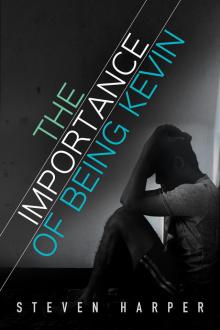 The Importance of Being Kevin
The Importance of Being Kevin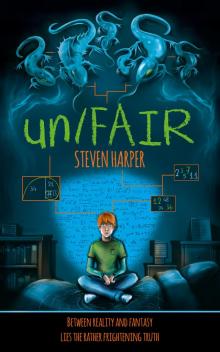 un/FAIR
un/FAIR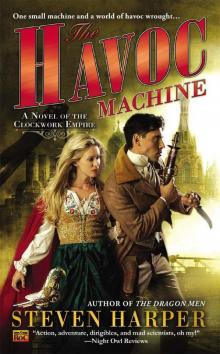 The Havoc Machine
The Havoc Machine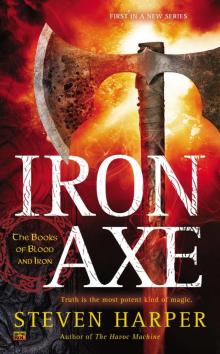 Iron Axe
Iron Axe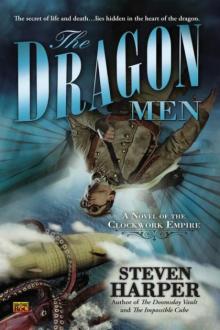 The Dragon Men
The Dragon Men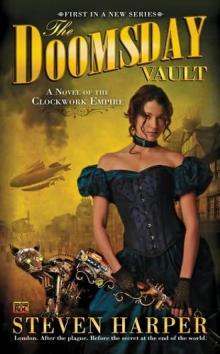 The Doomsday Vault ce-1
The Doomsday Vault ce-1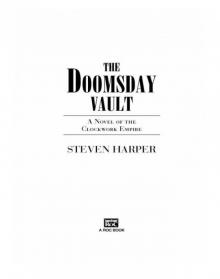 The Doomsday Vault
The Doomsday Vault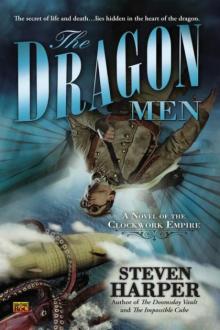 The Dragon Men ce-3
The Dragon Men ce-3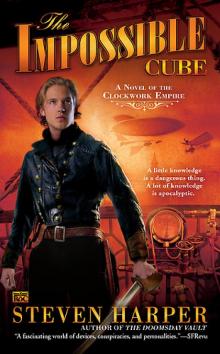 The Impossible Cube
The Impossible Cube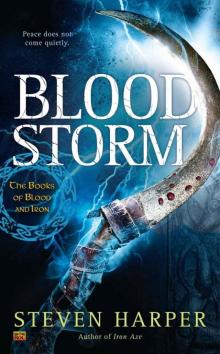 Blood Storm: The Books of Blood and Iron
Blood Storm: The Books of Blood and Iron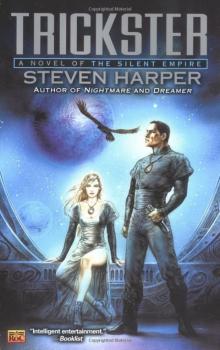 Trickster se-3
Trickster se-3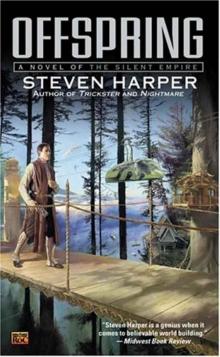 Offspring
Offspring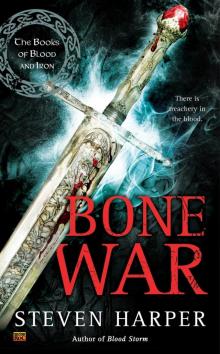 Bone War
Bone War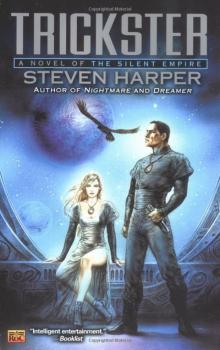 Trickster
Trickster Unity
Unity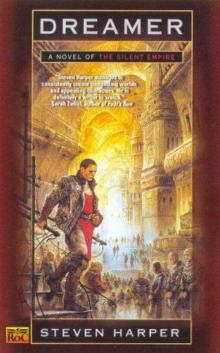 Dreamer
Dreamer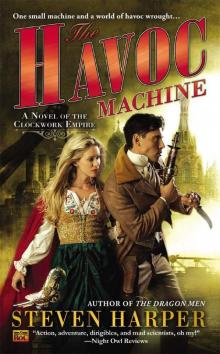 The Havoc Machine ce-4
The Havoc Machine ce-4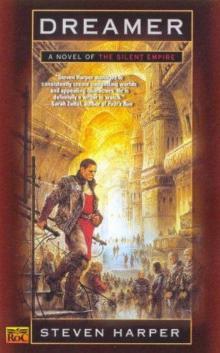 Dreamer se-2
Dreamer se-2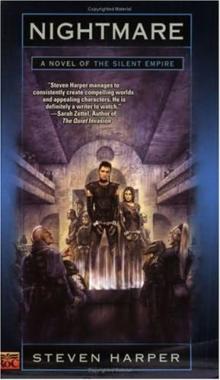 Nightmare se-2
Nightmare se-2